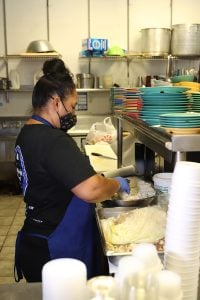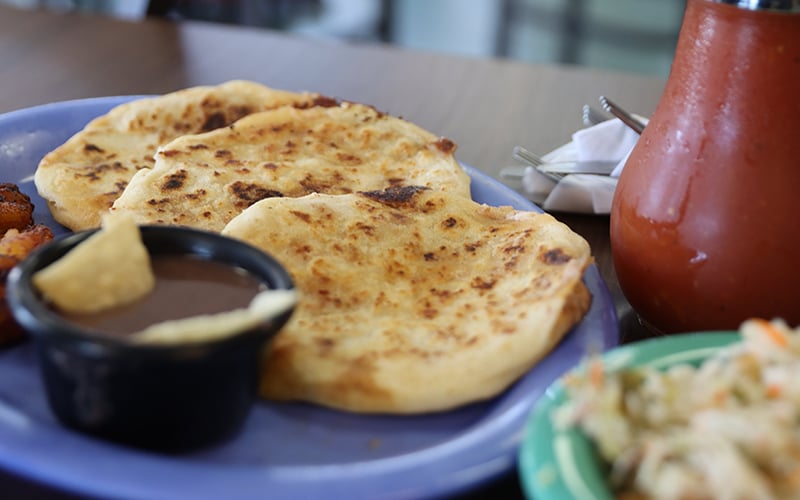PHOENIX – The walls of Salvadoreño Restaurant No. 3 in north Phoenix are a magnet for your eyes: shades of orange, blue and green – like the feathers of a tropical bird. The scene depicts women serving pupusas in the streets of El Salvador.
Then there’s the aroma of pupusas – corn dough stuffed and fried with beef, chicken, cheese, beans, bacon, pepperoni or vegetables. They are the national dish of El Salvador and the restaurant chain’s specialty.
The owners of Salvadoreño Restaurant had a clear mission when they opened the doors in 2002.
“There’s not a lot of Salvadorian restaurants in the Arizona community,” said Yesenia Ramirez, co-owner of the family chain. “There weren’t a lot of options for our culture, our country.”
Before the COVID-19 pandemic struck in March 2020, the company had grown to five restaurants in Arizona, one in California and another Valley location on the way, according to its website. But during the pandemic, the owners struggled to keep their doors open.
“One of the biggest challenges initially was having to be quick, you know, and respond to change immediately,” Ramirez said.

Veronica García prepares Salvadoreño Restaurant’s specialty dish, pupusas, in Phoenix. (Photo by Ella Ho Ching/Cronkite News)
The program directed Small Business Administration loans to businesses affected by COVID -19 shutdowns, with the possibility that the loans would be forgiven if the money was used to keep workers on the payroll through the pandemic, according to the article.
Latino-owned businesses were hit especially hard during the COVID-19 pandemic but received less relief than other businesses, according to a May 2020 national survey by Latino Decisions for MoveOn, Somos and UnidosUS. At the time, hundreds of local Latino-owned businesses had applied for the federal Paycheck Protection Program, but only a small portion received any relief, Tanairi Ochoa-Martinez, director of Fuerza Local, told Cronkite News.
To help close that gap, nonprofit organizations have stepped to assist these small businesses when federal programs did not. Raza Development Fund, in partnership with Wells Fargo, launched the COVID-19 Hope Fund to provide relief to small businesses. Fuerza Local (Local First Arizona) provided a variety of relief grants to small businesses across Arizona, including a total of $2 million distributed to small business owners in low-to-moderate income households.
Businesses and business groups also pitched in. The Arizona Hispanic Chamber of Commerce offered resources and developed small-business grants. And PepsiCo launched Juntos Crecemos, to provide grants, mentorship and coaching to 150 Hispanic-owned small businesses across the country.
As a result of the pandemic, 86% of Latino business owners reported significant negative impacts, and 65% said they would not be able to continue operations beyond six months under current conditions, according to a 2020 Stanford University survey of 224 businesses.
In announcing the program, C.D. Glin, vice president of the PepsiCo Foundation and the company’s global head of philanthropy, said Hispanic communities are part of the fabric of American culture but have long faced “systemic barriers to success – a divide only deepened by the impact of COVID-19.”
Salvadoreño Restaurant is one of the PepsiCo beneficiaries.
Ramirez said they faced financial hardship as COVID-19-related restrictions across the state limited dining in spring 2020. The owners calculated the restaurant lost 30% to 40% of sales in the first months of the pandemic.

Pupusas – corn dough stuffed and fried with beef, chicken, cheese, beans, bacon, pepperoni or vegetables – are the national dish of El Salvador. (Photo by Ella Ho Ching/Cronkite News)
Takeout became the only viable option to keep the business afloat, but shortages of plastic containers and rising prices for kitchen materials stretched the restaurant thin.
It’s been more than a year and a half since the start of the pandemic, and some of the regulations have loosened. Ramirez said sales are better, even though a lot of customers continue to prefer takeout.
Part of the lessons learned for Ramirez was the importance of a strong social media presence for a small business.
Angie Amarillas, senior director of small business development at the Arizona Hispanic Chamber of Commerce, said the online presence for Hispanic-owned businesses is only growing. A recent survey of the chambers’ members indicated 26% of Arizona’s Hispanic-owned businesses are creating and improving their social media presence, she said, adding, “That’s really huge.”
Many Hispanic-owned business owners such as Ramirez realized the importance of maintaining a robust social media presence.
“That consistency definitely reminds people that we’re here, that we’re serving this amazing food,” Ramirez said. “And it keeps them coming, it keeps them aware of what’s happening too.”
As COVID-19 outbreaks persist in Arizona, Ramirez said Salvadoreño Restaurant prioritizes keeping everyone safe.
“We’re trying our best to make sure we keep our customers as safe as possible. The staff wears their masks. They’ve all been vaccinated,” Ramirez said.
“At the end of the day, the most we can do is do our part. Let’s try to get through this together.”


